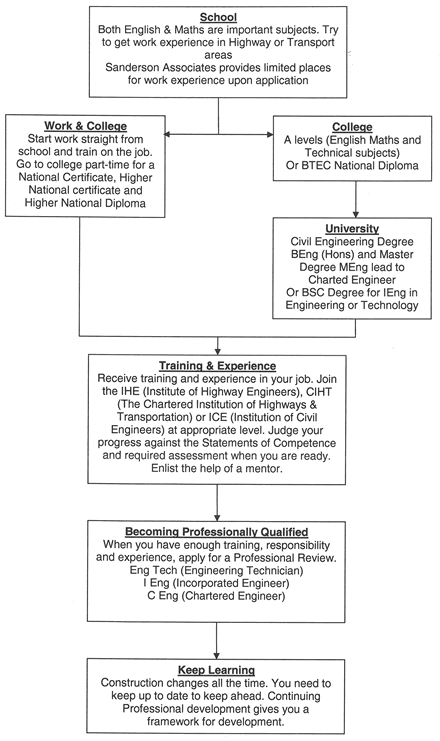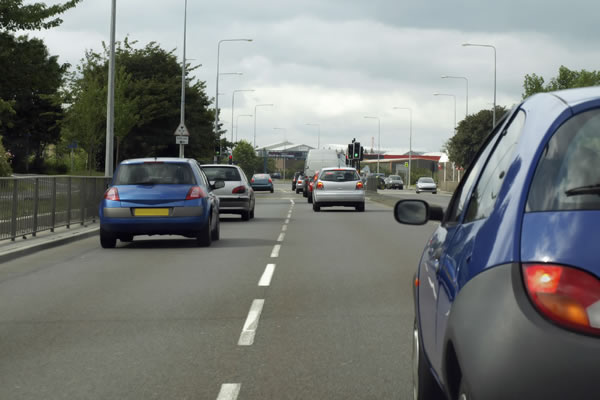A Career as a Highway Engineer
A career as a Highway Engineer is very rewarding in a number of ways. You will be involved in many different projects from minor proposals right the way through to complex high profile major developments which may be of national or regional importance. One particularly rewarding aspect is seeing the development you have worked on being built and operating successfully for years to come.
You will meet a wide variety of different people from clients who may be professional developers, specialist service providers such as Health Care Trusts and members of the public. You will often be part of a multi-disciplinary team and will meet with architects, planners, air quality and noise consultants, structural engineers and quantity surveyors to name but a few. You will engage with Local Planning and Highway Authorities and third parties such as elected officials and local residents during the planning process.
The 'Road' to becoming a Highway Engineer
Whilst at school concentrate on English and Maths and very importantly develop your communications skills. Being able to put across your ideas and technical findings in a simple understandable manner is particularly important and any experience that improves your confidence in speaking to people is very worthwhile. Don’t worry if this seems daunting, your agreed training and development programme will cover this and effectively you will "not be thrown in at the deep end without first being taught how to swim".
To gain experience of just what it’s like try to obtain a work experience placement with a professional Highway Engineering practice. Sanderson Associates offer limited places for work experience.
Following school then the options are realistically two fold.
Work and College
After leaving school commence work as a Trainee Technician. Take advantage of the Governments Modern Apprenticeship schemes which will give you access to “on the job” training and day release further/higher education to complete a National Certificate, Higher National Certificate or Higher National Diploma.
Full time Study
Attend college and obtain A levels in Maths, English and associated Technical subjects followed by attending University to obtain a Civil Engineering Degree BEng (Hons) and Master Degree MEng which would lead to Chartered Engineer status or BSC Degree for IEng in Engineering or Technology.
Both the above routes should then lead to on the job training and experience, however, the day release student would have, by this time, already accumulated a vast amount of training and experience on the job.
As an example, one of our now senior Principal Engineers and Team Leaders commenced work with us here at Sanderson Associates whilst studying at University, working in his spare time carrying out Traffic Surveys and during the period of his University studies he took a year out placement with Sanderson Associates.
On the Job Training and Experience
Whilst on the job, receive training and experience, Join the IHE (Institute of Highway Engineers), CIHT (The Chartered Institution of Highways and Transportation) or ICE (Institution of Civil Engineers) at your appropriate level.
Monitor your progress against the Statement of Competence and required ongoing assessment when you are ready, enlist the assistance of a mentor.
Become Professionally Qualified
When you have received sufficient training, responsibility and experience apply for a Professional Review which depending on your route leads to the various stepping stones in your career of Eng Tech (Engineering Technician), IEng (Incorporated Engineer) or CEng, (Chartered Engineer).
Very simply the Professional Review will require you to submit examples of you work and experience to date and usually to attend an interview with a panel of professional engineer reviewers appointed by the Institute for this purpose. Your reports and experience must meet Engineering Council standards for the appropriate progression. To help the IHE provide courses to explain what is involved in the Professional Review and how you can prepare in order to convince the panel that you meet the standards using your work experience. IHE panel reviewers and mentors attend these courses to pass on practical tips and advice.
Keep Learning
The construction industry is constantly changing and you will always need to keep up to date to keep ahead. Membership of a professional body, such as the IHE, will stipulate the number of Continuing Professional Development (CPD) days/hours required each year to maintain your position. CPD is a vital part of career progression and will give you a framework for ongoing development.
Download the below Flow Chart in PDF Format here.

What Our Clients Say:
Swept Path Analysis and Visibility Drawing incorporated into a Technical Note, Proposed Residential Dwelling, Colchester.
Highway Statement, Proposed Residential Development, Stockport
Transport Assessment, Proposed Residential Development (170 dwellings), Essex
Speed Survey, Proposed Private Residential Development – Testimonial
Access Feasibility Study, Proposed Private Residential Development – Testimonial
Analysis of Speed Survey and Swept Path Analysis
Stage 2 Road Safety Audit, Residential, Staffordshire
Construction Traffic Management Plan
Flood Risk Assessment, Testimonial, Industrial Development, Sheffield
Travel Plan
Require the Services of a Highway Engineer?
Sanderson Associates have enjoyed over 37 years in business delivering experienced Highway Engineering Services to our clients, having completed over 12,200 schemes for a wide variety of major and minor developments throughout the whole of the UK, Isle of Man and Ireland.
We would be pleased to provide you with our competitive fee proposal to provide you with our Highway Engineering Services, please call us on 01924 844080 or click here to complete our secure online form.



